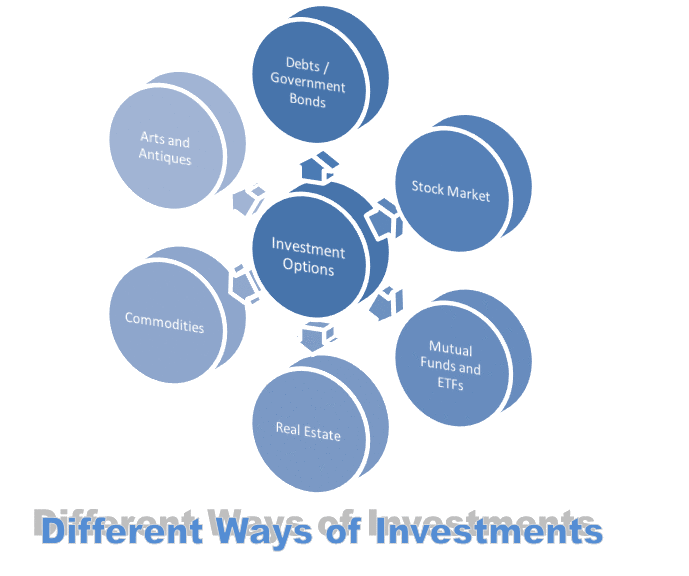Individuals are constantly searching for the best ways to invest their hard-earned money in an era of unstable economic conditions and constantly shifting financial environments. Even though the prospect of quick wealth could be alluring, wise planning, perseverance, and understanding are necessary for successful investing. Long-term financial growth and stability depend on understanding the top five ways to invest your money and make a profit, regardless of your experience level in the financial industry.
This post will examine the top five methods for investing money and making a profit. We’ll explain the fundamentals of each strategy, list important considerations, and offer advice to help you make wise investment choices. Understanding these investment possibilities can empower you to take control of your financial future and optimize your outcomes. Whether your goals include building wealth for retirement, generating passive income, or increasing your savings, exploring these investment opportunities is crucial. Let’s embark on this journey together and realize our potential for financial success.
Overview
The investment landscape offers a multitude of options to fit a wide range of risk appetites and financial ambitions, from conventional strategies like stocks and bonds to cutting-edge possibilities like cryptocurrency and real estate. It is important for investors to consider all paths because each has advantages, risks, and possible returns of its own.
There are many areas of investments and different ways to invest your money and creating wealth. Investment class are broadly categories based on risk to reward ratio as below:
- Debts / Government bonds / Fixed income deposits.
- Stock Market / Mutual funds.
- Real Estate.
- Arts and Antiques.
- Commodities (Gold / Silver / Other Precious Metals).
Now a day’s most of the investment class possess electronic existence assets to benefit investors. There is not necessary to buy assets in physical existence if electronic form is available.
Top 5 – Best Ways to Invest your Money
If you are a beginner you can start with investing little money and then once you understand how it works you can increase your investment.
Debts / Government bonds / Fixed Income Deposits
Debts / Government bonds / Fixed income deposits rewards fixed income on your invested amount year on year. This asset class involves minimal risk but as your knowledge grows, you can discover risk-free investment options. Any investment carries some level of risk, as evidenced by government bankruptcies in recent years. But in general belief, debts or Government bonds or fixed income investments can achieve you returns between 5-9%. When you compare the returns with growing inflation rates it may feel as not best investment option. The recommendation advises investors to allocate only a small fraction of their investment to government bonds, debts, corporate bonds, or fixed income deposits. This allocation forms a part of your diversified investment plan. It helps in mitigating the impact of risk on your portfolio.
Stock Market / Mutual Funds
At a beginner you may find this asset class involves little risk when compared with other investment options. As and when you get more knowledge on it you can gradually develop way to invest risk free into stock market or mutual funds as well. Indian markets are way more ahead in returns when compared with other world markets. Generally it is understood that stock market or mutual fund investment can assist you to reach 20-25% returns averagely in long run. For example: Consider any stock may be Infosys / Lupin / Asian Paints / Tata Motors / Sun Pharma / ITC / TCS and compare the price traded a decade back with current price. You will get fair idea of returns you can expect from this type of investment class.
Real Estate Investment
If you have a huge amount picked for investment then investing in real estate may be good option for you. This type of asset class are categorised as low risk with high returns investment. If you are planning to invest in real estate you can expect to get around 10-15% capital appreciation year after year. If you dont know about trading or other investment then this is the best ways to invest your money. Most popular disadvantage of real estate investments are:
- It takes months or sometime years to convert investment back into cash / liquid form.
- Minimum investment amount is huge and if you are planning to invest via home loan then your return on investment will decrease and may not look attractive any more.
Commodities (Gold / Silver / Other Precious Metals)
Typically, when the stock market falls, the price of precious metals rises, and conversely, when the stock market rises, the price of precious metals falls. This dynamic occurs due to investors shifting their investments from one asset class to another. One should also consider investment into precious metals as well in order to diversify investment and to reduce volatility and risk on portfolio hits. Investing in gold, silver, or any precious metal offers a significant advantage: they can be easily and quickly converted into cash, typically within a day, unlike other asset classes. Stocks and mutual funds, for instance, generally take 2-3 days to liquidate, while fixed deposits and bonds may take 3-6 days for conversion.
Arts and Antiques
Earlier days investing in these assets class was not considered as investment options. This is a unique kind of investment class getting popular these days. If you are a business man or high net worth individual possess guts to invest in start-up firms or start-up artists or financing to expand corporate firms, etc you can expect returns growing with the pace of 25-40% year after year. One should be good at forecasting, forecasting future trends, forecasting future opportunities to be Art and Antiques investor. This art and antiques markets are highly risky and let us see some of the disadvantages of investing in Art and Antiques investor are:
- There are no standard valuation methods or principle defined is always based on subjective.
- Investing require full transparency and lack in rules and regulation.
- Converting investment into liquid / cash is forever doubtful.
- Benefits on such investment class cannot be pledged / promised.
- Investment requires space for start-ups or storing artist unique work
Insurance is Not Investment Class
For decades, people worldwide have generally believed that insurance is a component of investment assets. Now a day’s there are varieties of insurance options are available. For example: Insurance cum Investment. Insurance policy is a contract agreement between insurance company and insured person to compensate losses under occurrence of unexpected events. In financial planning, investing in options like these is not considered an investment because the investment goal differs from the insurance goal. In simple words, Investment and Insurance are two sides of coin under financial planning. This wrong belief from decades needs to be corrected.
Conclusion
In this guide we have learned about various differnt ways to invest your money. After this tutorial you should be able to draft high level road map for your investment options. 22nd Principal of financial planning says ‘diversify your investment’. It is always recommendable to diversify your investment into different asset class as a part of proper investment plan. Under proper investment plan, you should create a balanced diversified portfolio based on the risk and returns you are hopping as a plan of your long term financial planning goal.
Read E-Learning Tutorial Courses - 100% Free for All
Basics of Investing for Beginners
- Chapter 1: What is Investment and its objectives?
- Chapter 2: Why is Investment important for Economic growth?
- Currently Reading: Ways to Invest your Money and Make Profit
- Chapter 4: Best Investment Opportunities for your Retirement Income
- Chapter 5: What are the Legal Matters you should know before Investing?
- Chapter 6: Different Types of Investment Risks Involved in Investing
- Chapter 7: When and How to Invest in Stocks?
- Chapter 8: How Positive Attitude can improve your Investing mindset?
- Chapter 9: Should you Borrow Money to Invest in Stock Markets or Funds
- Chapter 10: 5 Rules of Thumb - To be consider before making Investments
- Chapter 11: How to Calculate Stock Market Returns and Break Even Point?
- Chapter 12: How to Calculate Compound Interest and Simple Interest?
- Chapter 13: Rule of 72, 114 and 144 of Compounding Interest formula
- Chapter 14: What is the Difference between Trading, Investment and Speculation?
- Chapter 15: How to become a Smart Investor or a Successful Investor
- Chapter 16: Tutorial Quiz – Basics of Investing for Beginners Module







